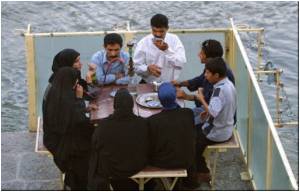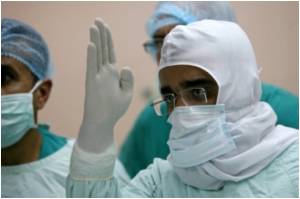The two girls wake up before dawn each day, row their wooden skiff out into Gaza's heavily-patrolled waters, and try to catch enough fish to feed their family.

But Madeleine Kulab, 16, and her sister Reem, 13, have had few other options since their father was struck with palsy 10 years ago, and like many women in Gaza have had to work for wages once earned by men.
For the last four years Israel and Egypt have largely sealed the borders of the Palestinian enclave, ruled by the Islamist Hamas movement since June 2007, pushing the local private sector to the brink of collapse.
Gaza's unemployment rate hovers around 40 percent, with 80 percent of the population, including the Kulab family, relying on foreign aid.
"How are we supposed to survive without catching fish? My father has palsy in his feet and cannot work," Madeleine said as she and Reem plucked tiny fish from their nets on Gaza's sandy shore.
The girls wear jeans, long-sleeve shirts and headscarves, even while swimming, in keeping with Gaza's conservative customs.
Advertisement
The medium-sized catch of three kilograms of fish will sell for around eight dollars (six euros), and will have to support the family of five until the following morning.
Advertisement
Larger boats can go further, but as they approach the three nautical mile (5.5 kilometre) mark Israeli warships turn them back with warning shots and occasionally seize the vessels as part of a naval blockade on the Hamas-ruled coastal strip tightened after the 2008-2009 Gaza war.
The vast majority of profits come from sardines and adult fish, which mostly swim further out. In recent years Gaza has started importing growing numbers of fish from Israel and Egypt, further squeezing the fishermen's livelihoods.
Last month Israel said it would start allowing all purely civilian goods to enter Gaza but the naval blockade remains in place and the economy is hamstrung by the lack of virtually any export channels.
The girls' father learned to fish from his father and grandfathers, who lived near what is now the Israeli city of Ashkelon before they fled during the 1948 war that attended the creation of the Jewish state.
"I taught Madeleine and Reem how to swim and fish so they could support themselves," Mohammed, 52, says. "The priority should be for them to finish their studies, but what can I do?"
The children are only able to fish for a couple of hours before school on weekdays, but sometimes they go back out in the evenings.
"I work for an hour or two and then I go to school. I always have my uniform and my school bag with me so I am ready to go," Reem said as the family lit a cooking fire to make breakfast.
She loves the ocean but hopes one day to finish her studies and become a journalist. "I want to focus on the suffering of people like us, because life has been really unfair to us," she said as she stoked the fire.
Mohammed hopes his children can keep up the family tradition. He has a larger boat that in better times could make for a profitable business, but the engine needs a 500-dollar (380 euros) part which he cannot afford.
"I hope when my kids grow up they can use it," he said.
The girls defy traditional roles in Gaza's conservative Muslim society, but the residents of their poor seaside neighbourhood, who share their predicament, have been supportive.
"There is no shame in work," says Mohammed Jahjuh, 19, another fisherman. "We live with more dignity than beggars."
Hassan Siyam, 20, a friend of the family who has helped the girls from time to time, understands their struggle.
"There is nothing here for young people," he said. "My father is unemployed, and that's what forced me five years ago to go to the sea and fish in order to support my family."
The girls know their trade is risky, and at times they have had to ditch their nets and race back to shore at the sound of Israeli gunfire. Both know of fishermen who have been shot and wounded out at sea.
"Sometimes I get really scared," Reem said. "But I am not ashamed around my friends at school because I help my father and my siblings, and I am reducing the burden on my mother."
Source-AFP








